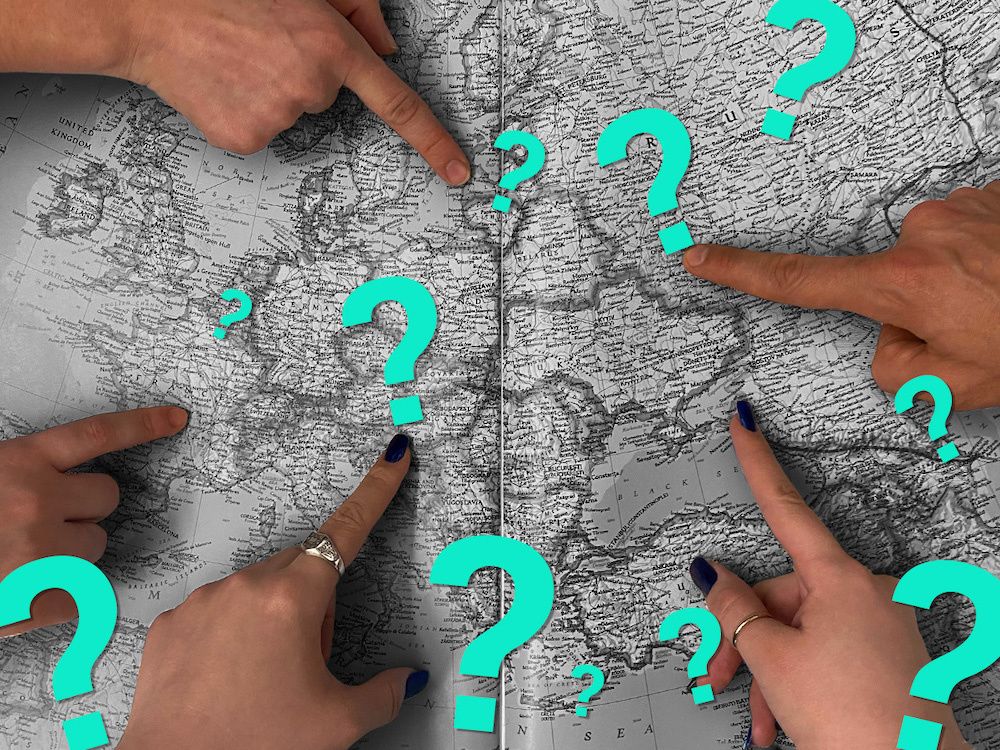January 30, 2020
Or was that Bangladesh? Hey, it's not us asking, it's Secretary of State Mike Pompeo, who recently had a noisy tiff with veteran National Public Radio reporter Marie Louise Kelly. Piqued by her unwelcome questions about Ukraine, Pompeo apparently blew his top, barking, "Do you think Americans care about Ukraine?" To prove his point, he pulled out a world map with no writing on it and demanded Kelly find the country at the heart of his boss' impeachment trial. If Pompeo thought Ukraine was beside the point, Kelly almost certainly knew it was beside Moldova. But in a sulking statement afterwards, Pompeo blasted NPR and closed with "it is worth noting that Bangladesh is NOT Ukraine."
Noted. Bangladesh is not Ukraine! And thank heavens we cleared that up before the Secretary headed to Kyiv on Thursday – what a crazy mix-up that avoided. (Phew.)
But none of that answers the question: Do Americans care about Ukraine? Former Ambassador to Ukraine Bill Taylor says they should. Soon enough, John Bolton may weigh in as well, if the former national security advisor becomes an impeachment witness. That'd certainly give us even more reason to think of Ukraine as Our Kraine.
But truth is that most Americans only kinda care about the place at best. For starters, most of us can't find Ukraine on a map — justone in six. And you could reasonably conclude that most Americans wouldn't know about Ukraine at all if the country were not Exhibit A in the prosecution (or defense) of a president we see as guilty (or framed). Not that Ukraine should feel especially snubbed: three-quarters of Americans also couldn't find Iran on a map, and that was just days after the Trump administration killed that country's top general.
So, do our general cartographic shortcomings matter? Again, kinda: for one thing, it seems that the less likely you are to find Ukraine on a map, the more likely you are to support bombing it. And if that holds for all countries, then keeping Pompeo's unmarked maps away from average American voters is a well-demarcated global security issue. (Quick digression: not for nothing, but why exactly does the Secretary of State have unmarked maps at the ready like that?)
To that end, this general map-prehension may hold lessons for the Democratic presidential hopefuls currently storming Iowa (that's next to Ohio, right?) True, foreign policy usually doesn't figure as the most primary of primary issues in US elections, but the candidates still need to grapple with the fact that Donald Trump has pulled the rug out from under 70 years of Washington foreign policy – once a point of American pride that saw the US as an indispensable leader on global issues like trade, security, and finance. They must ask themselves: have we reached the point of no return? Can we go back to the where we were pre-2016, as Joe Biden seems to believe? Or, as other frontrunners Bernie Sanders and Elizabeth Warren seem to grasp in their own ways, perhaps the halcyon days of US leading globalization (while, yes, juggling endless wars) are behind us. What's going to come next? Hard to say just where this path will lead.
It's disorienting. Thankfully, in the words of noted foreign policy expert Judah Friedlander, one truth will always guide us: "America is the greatest country in the United States."
Worth noting.
Kevin Bleyer is an Emmy-winning veteran of The Daily Show with Jon Stewart and Dennis Miller, and the author of Me the People: One Man's Selfless Quest to Rewrite the Constitution of the United States.
More For You
Xi Jinping has spent three years gutting his own military leadership. Five of the seven members of the Central Military Commission – China's supreme military authority – have been purged since 2023, all of whom were handpicked by Xi himself back in 2022.
Most Popular
Sponsored posts
Five forces that shaped 2025
What's Good Wednesdays
What’s Good Wednesdays™, January 28, 2026
Walmart sponsored posts
Walmart’s commitment to US-made products
- YouTube
In this episode of GZERO Europe, Carl Bildt examines how an eventful week in Davos further strained transatlantic relations and reignited tensions over Greenland.
- YouTube
In this episode of "ask ian," Ian Bremmer breaks down the growing rift between the US and Canada, calling it “permanent damage” to one of the world’s closest alliances.
An employee works on the beverage production line to meet the Spring Festival market demand at Leyuan Health Technology (Huzhou) Co., Ltd. on January 27, 2026 in Huzhou, Zhejiang Province of China.
Photo by Wang Shucheng/VCG
For China, hitting its annual growth target is as much a political victory as an economic one. It is proof that Beijing can weather slowing global demand, a slumping housing sector, and mounting pressure from Washington.
© 2025 GZERO Media. All Rights Reserved | A Eurasia Group media company.
